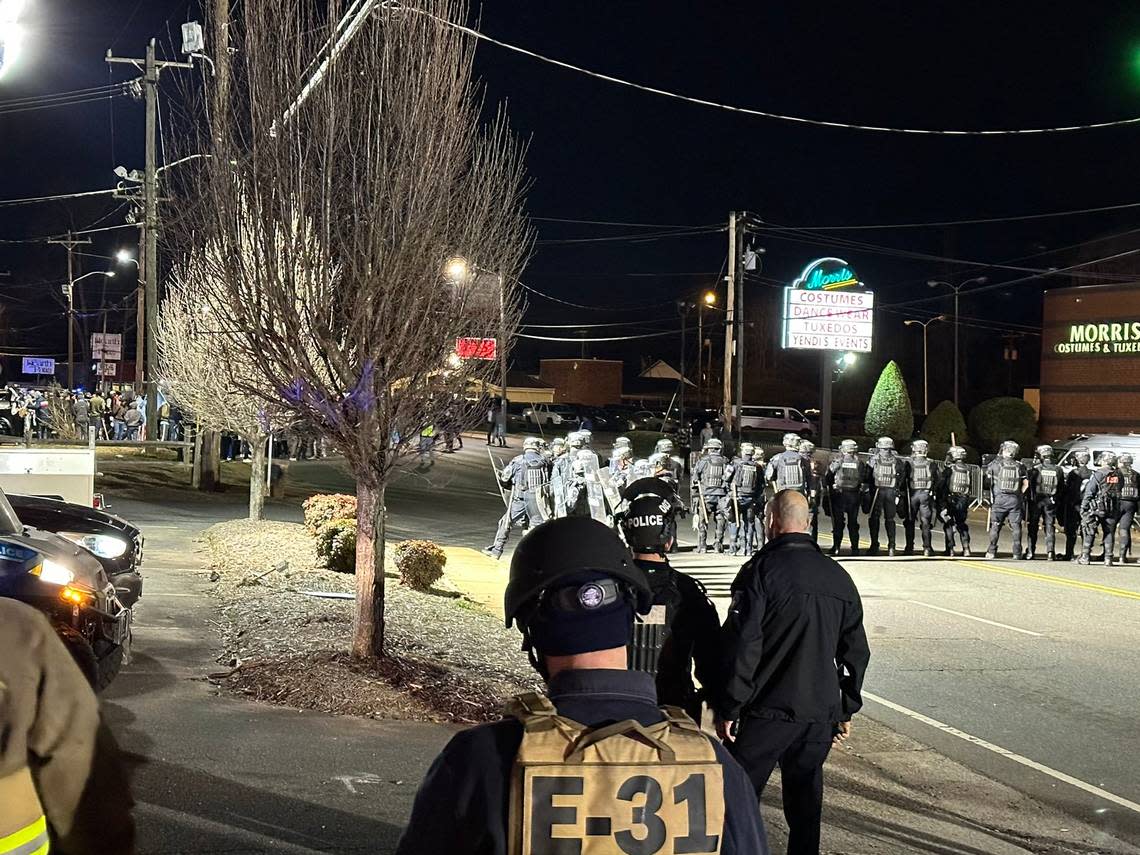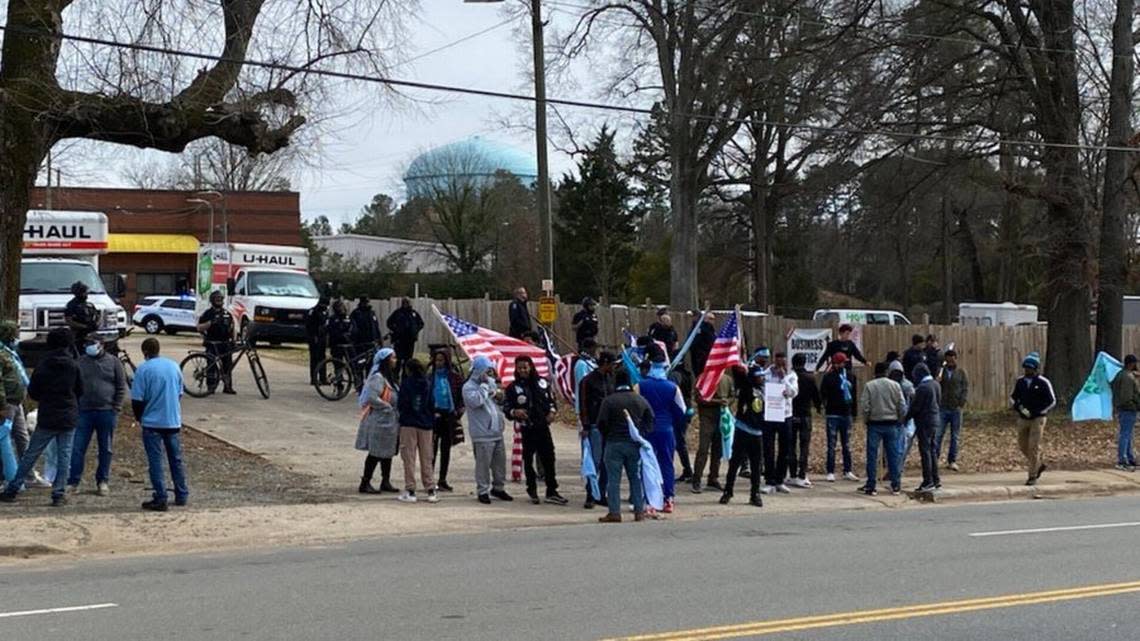How Charlotte’s Monroe Road became the site of an international political protest
A Charlotte activist stood with protesters along Monroe Road last Saturday to confront who they thought represented a repressive foreign regime.
The crux of the dispute centered around an Eritrean cultural event held in the area that protesters believed was a celebration of the Eritrean government.
Helen, an activist of Eritrean descent living in Charlotte who did not provide her last name out of concern for relatives still in the country, said she and other protesters wanted to openly oppose the East African nation after learning online that the event would be held in the city. The country’s president, Isaias Afwerki, who has been in power since 1993, is a dictator, they say.
“We have been advocating and speaking for our people who don’t have a voice,” Helen told The Charlotte Observer. “Anyone who questions the government there gets arrested, imprisoned, or killed.
“We are against these (Eritrean political) events because these events are illegal. The regime is still trying to oppress people.”
Monroe Road became the site of an international political clash that drew a reported crowd of 200 people and led to violence and eight arrests by Charlotte-Mecklenburg Police. Those jailed were charged with impeding traffic, inciting a riot and assaulting a police officer.
An unknown number of protesters were treated at the scene for injuries related to pepper spray used to disperse the crowd. CMPD reported that a tractor-trailer was set on fire.

And while Mecklenburg County is home to 1,340 Eritrean people, a majority of the 2,380 who live in North Carolina, it’s not the only place where these kinds of protests are occurring.
A similar situation occurred last week in the Netherlands, Sky News reported. There, two rival groups clashed as loyalists to Eritrea’s government held a meeting in a venue that was attacked. Similar incidents have occurred recently at festivals in Canada, Sweden and Germany. In January, protests erupted in Indianapolis ahead of a planned Eritrean celebration of the new year.
At a violent demonstration in Israel last September, opposition groups vowed to continue disrupting pro-Eritrean government festivals.
The conflict at Saturday’s gathering highlighted the deep divide among members of the Eritrean diaspora — those who remain close to the government and those who have fled and strongly oppose Afwerki.
Illustrative of that ideological separation is Kevin Kash, an Eritrean who moved to Charlotte 32 years ago to attend UNC Charlotte and was part of the celebration. He said the group was neither celebrating the Afwerki-led government nor had any ties to it.
Instead, Kash and others gathered to commemorate the 34th anniversary of the Eritrean War of Independence military victory fought in Massawa along the Red Sea in 1990 against the Ethiopian army, he said.
Kash, who said he was kicked and spit on by protesters carrying “sticks with nails” and told to “get out and get away” on Saturday, said he respected those who disagree with the current Eritrean government. But violence will only sow even more discord.
“You can criticize the government and the issues at hand,” said Kash, who said he doesn’t support repression but simply pride in his country. “We can debate politically. Please tell me your ideas. If they (protesters) care about democracy, why did they deny my democratic right to assemble?”
Eritrean government committed ‘inhumane acts’
There is a widespread belief by Eritrean refugees, who fled the country for Europe and other western nations, that the celebratory festivals involving partying, dancing and comedy shows are a front to finance the government and promote political propaganda.
Human Rights Watch, a group that investigates and reports on global abuses, says Eritrea’s government “subjects its population to widespread repression, including widespread forced labor and conscription, staunch restrictions on freedom of expression, opinion, and faith, and restricting independent scrutiny by international monitors.”
Eritrea, which gained independence from Ethiopia in 1991, has been dubbed by human rights groups as the “North Korea of Africa.” In 2016, a report by the United Nations Human Rights Council found reasonable grounds to believe the Afwerki regime committed crimes against humanity.
“Eritrean officials have engaged in a persistent, widespread, and systematic attack against the country’s civilian population,” the report stated. “They have committed, and continue to commit, the crimes of enslavement, imprisonment, enforced disappearance, torture, other inhumane acts, persecution, rape and murder.”
‘Understand why people would travel to Charlotte’

Human Rights Watch says as many as half a million of Eritrea’s 5 million people fled the country since the People’s Front for Democracy and Justice took power.
John Stauffer, president of Pennsylvania-based nonprofit The American Team for Displaced Eritreans, told the Observer that protests and festivals often happen in cities because that’s where Eritrean nationals live.
“You can understand why people would travel to Charlotte to demonstrate,” Stauffer said.
Even though Helen says she’s received threats since Saturday, there is comfort in speaking freely without government consequences. In America and elsewhere, she says, Eritreans can enjoy fundamental human rights not afforded to them in their home country.
“It is the American dream,” said Helen, whose parents moved from Eritrea to Charlotte more than 30 years ago. “You can’t even speak to your family members in that country about the government.”
NC Reality Check reflects the Charlotte Observer’s commitment to holding those in power to account, shining a light on public issues that affect our local readers and illuminating the stories that set the Charlotte area and North Carolina apart. Have a suggestion for a future story? Email realitycheck@charlotteobserver.com
